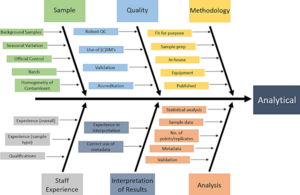A Weight of Evidence Toolkit for Food Authenticity Investigations
A Toolkit to Support Weight of Evidence Approaches for Food Authenticity Investigations published by Defra.

A Toolkit to Support Weight of Evidence Approaches for Food Authenticity Investigations has been published by Defra.
Applying a weight of evidence approach for food authenticity investigation is relevant in situations where screening tests which do not give a definitive answer are used. An example of such tests are non-targeted fingerprinting approaches for food authenticity testing which rely on probability-based interpretation of the data. In these situations, gathering and assessing the weight of evidence can help in drawing a conclusion on the authenticity of a sample/product.
This document provides a structured outline on how to approach a weight of evidence assessment to verify the authenticity of food and drink samples where there is no single confirmatory test result available.
Paul Hancock, Head of the office of the Government Chemist, chaired a working group, which was a sub-group of Defra’s Authenticity Methods Working Group (AMWG), drawing on analytical testing, enforcement, and food industry expertise to produce this document.
Access the Weight of Evidence Toolkit.
This toolkit is designed to support anyone who is required to make an assessment on the authenticity of a food or drink sample based on a combination of information from several independent sources, including analytical testing information. The guidance is intended particularly to support enforcement officers who may be required to undertake a weight of evidence assessment on the authenticity of a sample to inform appropriate follow-up action. But it may also be of interest to anyone in the food and drink industry who undertakes supply chain audits and due diligence checks as part of any fraud/authenticity investigation.